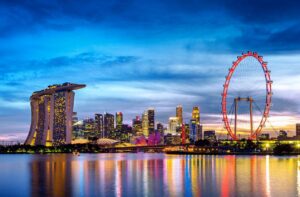Singapore is an excellent place for expats to live, offering a fascinating blend of cultures, fantastic job possibilities, and first-rate amenities. The cost of living in Singapore is high despite the high standard of living. However, if you’re a student or on a fixed income, there are some easy lifestyle adjustments you can do to get the most out of your money. You can save money and have a more genuine experience if you buy, eat, and use your free time like a local.
It’s helpful to have an idea of how much living in Singapore will cost you as an expat, whether you’re retiring, moving there temporarily, or moving there permanently. Here is a brief guide to Singapore’s cost of living:
Singapore’s cost of living in relation to the UK, EU, USA, and Australia
The Singapore dollar, denoted as SGD at currency exchanges and S$ in stores and restaurants, is the country’s official unit of exchange.
You can use an online currency converter to get the exact worth of your money in Singapore Dollars, however the following is a general idea as of the time of writing:
- $1000 = S$1376
- £1000 = S$1633
- €1000 = S$1419
- AU$1000 = S$917
| Cost of Living | 1 bedroom apartment in the city (monthly rent) | food for two (3 courses, mid range restaurant) | Transportation (monthly pass) |
| Singapore | 3,625 SGD | 83 SGD | 128 SGD |
| London | 3,156 SGD | 108 SGD | 245 SGD |
| New York City | 5,293 SGD | 138 SGD | 178 SGD |
| Germany | 1,734 SGD | 85 SGD | 120 SGD |
| Australia | 2,270 SGD | 105 SGD | 199 SGD |
The cost of changing money from foreign currency to Singapore Dollars (SGD) is a significant burden for expats living there. Even while your bank may advertise fee-free currency conversion, its cut is almost certainly built into the exchange rate it uses.
What are the standard costs of living in Singapore?
Where you choose to reside is one of the key determinants of how expensive living will be in Singapore. Although Singapore’s rental costs are extremely high, if you live outside the city center, your rent will be substantially lower.
| Living expenses in Singapore (excluding rent) | Average Cost |
| monthly for one person | 1,429 SGD |
| a single person, annually | 17,148 SGD |
| per year, university student | 6,000 SGD |
| each month, a family of four | 5,186 SGD |
| annually, a family of four | 62,232 SGD |
Utility Billing
Due to Singapore’s limited resources, your monthly utility expenses are generally greater than the national average. When they discover that their bills are significantly higher during the summer than any other time of year, Westerners moving to Singapore also face some level of shock.
This is explained by the necessity of air conditioning during the Singaporean summer.
Gasoline, water, and electricity
Depending on how much air conditioning you use, your monthly expenditures for energy, water, and gas might be anywhere from S$200 and S$600. However, this is dependent on the property. Your monthly expenses may be greatly reduced if your property has a gas supply.
Subscriptions for cable, broadband internet, and mobile phones
Mobile phone plans in Singapore aren’t exactly inexpensive, but they’re also not very pricey. As long as you choose the finest postpaid or prepaid plan for you, you receive the most value for your money. For postpaid memberships, expect to pay between $35 and $100 a month. Whether your package solely covers the sim or also includes phone coverage will affect the monthly fee.
In Singapore, residential internet connections are considerably more affordable, and you receive a lot of speed and data for your money. You are already getting at least 1GBPS with unlimited data at an average monthly cost of S$50 (no download limit).
In Singapore, cable subscriptions are both ubiquitous and reasonably priced. For the basic cable channels, you can start with a monthly membership of $28, but if you want the international news and HD channels, you’ll have to pay between $50 and $80.
Prices for groceries in Singapore
In Singapore, local products and fresh food are reasonably priced, especially when bought at neighborhood supermarkets or small grocers. The obvious difference between locally produced goods and imported Western goods is price.
- Singapore’s average grocery prices
- One dozen eggs cost S$2.50.
- S$2.50 for 1 carton of milk.
- 1 kilogram of chicken costs S$10.15.
- Apples ($4.64 for 500g or 1lb)
- One beer bottle costs S$4.99.
- One wine bottle costs S$40.64.
Education Cost
Singapore does not downplay the price of its educational system. Their openness doesn’t prevent expats from sending their kids to private international schools.
Government-run local schools
In Singapore, primary education lasts six years, secondary education four years leading to the GCE O Level examinations, or five years leading to the GCE N Level exams.
These schools mostly serve Singaporeans and permanent residents, though children of foreigners may also be admitted.
The following are Singapore’s local schools’ monthly fees:
Primary Education
- Free for residents of Singapore
- PR in Singapore costs S$205.
Secondary Education
- Citizens of Singapore pay S$5
- PR in Singapore costs S$380.
HealthCare Cost
Singapore is renowned for having Asia’s top healthcare system. The nation’s healthcare system was rated as the sixth best in the world by the World Health Organization.
Their healthcare system combines cutting-edge medical technology along with highly effective, reasonably priced medical solutions. Their healthcare system abides by stringent, governmentally required standards for quality, openness, tidiness, and safety.
The drawback is that employers in Singapore are not required by law to offer insurance to their employees. As a result, employers in Singapore do not offer health insurance benefits. This may not be a big deal for you if your remuneration does not include health insurance. Don’t worry though; even without insurance, healthcare costs aren’t overly expensive.
- The average cost of a visit to a general practitioner is S$40.
- You will pay between S$50 and S$80 for an x-ray and blood work.
- The cost of each appointment with a specialist will be between $75 and 125 Singapore dollars.
- In hospitals, ward costs for non-air-conditioned rooms can be as low as S$30.
- You may pay at least S$3,000 for a private lounge.
Additionally, health insurance in Singapore is inexpensive. You may need to pay S$2,000 or more every year for policies that cover hospitalization and surgery.
What is the typical wage in Singapore?
In general, salaries in Singapore are quite high. Despite falling off the list in the last year, it’s doing reasonably well in terms of expat incomes, according to certain studies. In reality, according to a report by ECA International, Singapore’s expat salaries rank 22nd globally.
The state actively works to increase the income of lower-wage workers, which is another fantastic aspect of living here. The government actively supports salary increases and boosts because it believes that “no worker is left behind as Singapore improves.” Various plans and tactics, such as the 5-year Progressive Wage Credit Scheme, are being implemented in an effort to move toward a more equal society.
| Occupation | Average Salary |
| Mobile Developer | 73,492 SGD |
| Teacher | 52,164 SGD |
| Graphic Designer | 37,077 SGD |
| Product Manager | 77,996 SGD |
| Cashier | 19,664 SGD |
| Copywriter | 49,412 SGD |
| Financial Analyst | 78,767 SGD |
| Software Engineer | 66,804 SGD |
| Web Developer | 51,739 SGD |
How much do homes and lodging cost in Singapore?
Around 90% of Singaporeans will own their homes as of 2022, which is a staggering percentage.
This is because of a strong public housing system that the Housing and Development Board made feasible (HDB). The state residences can be purchased by Singaporeans as well as leased for 99 years.
It is still feasible to get a suitable rental in Singapore if you are a foreigner. You have the same rights as Singapore citizens if you possess a job pass, a student pass, or certain other documents.13
Remember that you are not permitted to rent a property for less than three consecutive months; your landlord will let you know this.
Singapore’s benefits for living include:
- Improved Housing
- Safety
- Cleanliness
- Simple to Travel
- Diversity of Culture
Singapore’s drawbacks for living include:
- Higher living expenses
- The climate is not always favorable.
- For road travels, Singapore isn’t the best city.
- Roads are dangerous for bicycles and pedestrians.
- tougher laws
Conclusion
The cost of living and harsher rules add to concerns for expats migrating to Singapore even though the city has the best environment. If English is your first language and you are new to the city, you could also run into linguistic barriers. By considering the benefits and drawbacks of living in Singapore, it is abundantly evident that you must a solid financial foundation in order to purchase a home or a vehicle. Perhaps the solution to your current financial problems is a high-paying career.





